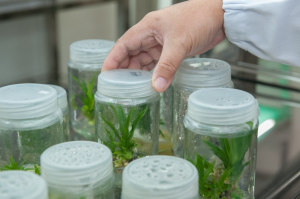
via Biofuelwatch:
“Biotechnology for Biofuels” includes in-depth investigations of three biofuel companies – Algenol, Mascoma, and Solazyme/TerraVia, and will be updated with forthcoming reports on algal and ligno-cellulosic biofuels, followed by further materials.
Policy-makers and industry leaders are pinning their hopes on biofuels and an entire bioeconomy where fuels, consumer goods, plastics, chemicals and materials currently derived from fossil biomass (oil, coal, natural gas) will instead be produced from living biomass (trees, crops, microbes). They mistakenly view this as a solution to climate change.
First-generation biofuels from corn, sugar, palm oil and soya are linked to deforestation and land conversion, competition with food, loss of biodiversity, land grabs and human rights abuses; along with reliance upon genetically engineered crops. But we are told that the “next generation” of ligno-cellulosic and algal fuels, made from “non food” biomass, will be better.
After at least a century of unsuccessful attempts to turn solid biomass into liquid biofuels through the use of heat and pressure, researchers and companies are focussing on biotechnology as key to cellulosic biofuel production and to a wider bioeconomy. This includes the use of potent new biotechnology tools, i.e. synthetic biology (aka “new breeding technologies”).

Researchers are engineering trees and crops to produce massive amounts of biomass designed for refinery processes, and are manipulating the genome of microbes, including micro-algae to secrete oils, enzymes and other chemicals of commercial and industrial interest. This is a primary focus of biotechnology, with a massive wave of new patent applications and the lure of large profits. But these engineered organisms are largely unregulated and poorly understood. They pose a serious threat to ecosystems and human health if they are released or escape into nature, which is inevitable.
Even after decades of research, there is no commercial production of ligno-cellulosic and algal biofuels. Companies are turning instead to using their genetically engineered organisms to production small quantities of high end consumer goods – expensive cosmetics, flavorings, nutraceuticals and various coproducts to maintain their profit margins. Some genetically engineered microorganisms are also being used to make conventional corn ethanol production more efficient.
Taxpayers are footing the bill, strung along by grossly hyped up claims about new technological breakthroughs just over the horizon – breakthroughs that will finally provide a clean, green and sustainable path to “consumerism as usual.” However, there is little basis for assuming that ligno-cellulosic and algal biofuels, if they were to ever be produced on a commercial scale, would in fact represent any improvement over first generation biofuels, since they too require land, water and agrochemicals as well as genetically engineered microbes.
Meantime, genetic engineering of trees and crops is being justified by the quest for a ‘bioeconomy’, too.

It is time to ask ourselves: are the risks worth it?
Algenol: Case study of an unsuccessful algae biofuels venture
Algenol is a Florida-based biotechnology company that has received considerable attention as one of the supposedly most promising algae biofuel startups, receiving $35-50 million in grants from the US government. However, after facing significant economic and technological hurdles to commercialization, the company shifted to producing algae products for food and fertilizer. Click here to read the report.
TerraVia/Solazyme: Synthetic biology company claimed to be capable of replacing palm oil struggles to stay afloat
TerraVia (formerly Solazyme) is a California-based algal oil company that received $22 million from the US government to produce algae biofuels. The company is now producing food and nutritional products after operating at a consistent financial loss for years. Click here to read the report.

Mascoma: The biggest misspending of public funds for cellulosic biofuels ever?
Mascoma is a synthetic biology company based in New Hampshire which received at least $100 and possibly over $155 million from the US government for cellulosic ethanol refineries that were largely never built.Click here to read the report.
ADDITIONAL RESOURCES/LINKS:
FOR FURTHER INFORMATION, VISIT:
‘New breeding techniques’ and synthetic biology – genetic engineering by another name. April 4, 2017 in The Ecologist
Biofuel or biofraud? The vast taxpayer cost of failed cellulosic and algal biofuels. March 14, 2016 in Independent Science News.
Reckless Driving: Gene drives and the end of nature, Briefing by the Civil Society Working Group on Gene Drives which includes Biofuelwatch, Econexus, ETC Group, Friends of the Earth US, Hawai’i SEED and Navdanya
Beware false promises: Algal oils and other products of synthetic biology aren’t about to save the orangutan…but carry serious new risks, Joint briefing by Friends of the Earth US and Biofuelwatch, February 2016
Cashing in on cellulosic ethanol: Subsidy loophole set to rescue corn ethanol profits, Almuth Ernsting, Independent Science News, August 2016
Biofuel or Biofraud? The Vast Taxpayer Cost of Failed Cellulosic and Algal Biofuels, Almuth Ernsting, Independent Science News, March 2016
Oil: $30-35 per barrel. Synthetic biology diesel: $3,180 to $7,949 per barrel. Game over?, Almuth Ernsting, The Ecologist, February 2016
Re-engineering life? The dangers of ‘next-generation’ biofuels, Almuth Ernsting, The Ecologist, September 2015
“Jurassic Park” and the Dinosaurs in the USDA, Rachel Smolker, Truthout, June 2015
Is Toxic Algae good for you?, Rachel Smolker, Huffington Post, August 2014
Consultation responses:
Comments submitted to: EPA Workshop for Public Input on Considerations for Risk Assessment of Genetically Engineered Algae, Rachel Smolker, October 2015